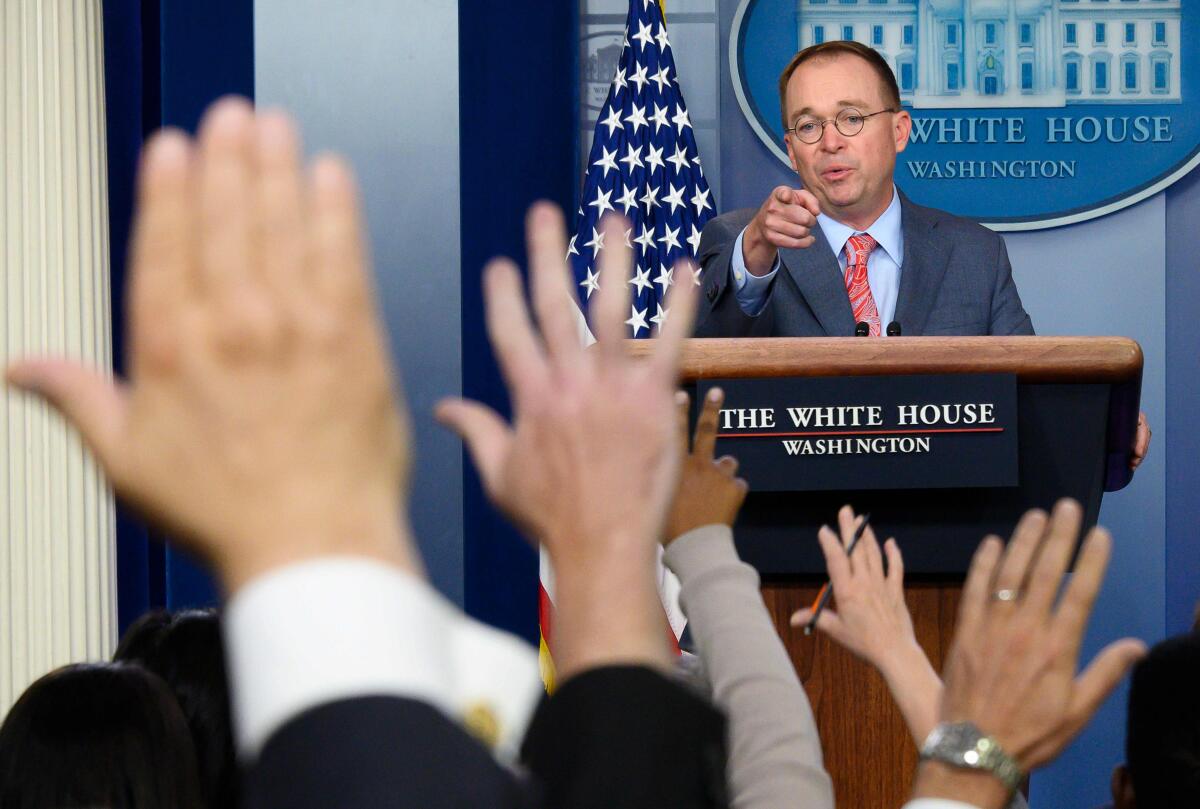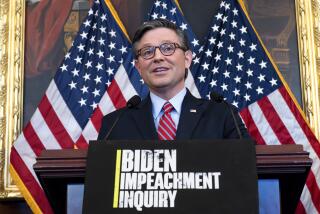White House stone wall crumbles. Now what?

President Trump and his allies thought they had a strategy to fight the House impeachment inquiry: block witnesses from testifying while labeling the probe “illegitimate.”
Plan A began crumbling this week as witnesses paraded to a secure bunker under the Capitol visitors center where House investigators questioned them for hours.
By week’s end, no clear Plan B had emerged.
Trump’s acting chief of staff, Mick Mulvaney, went off script in a rare news conference Thursday, seemingly admitting Democrats’ core charge that Trump had demanded a political quid pro quo from Ukraine — an investigation of his opponents in return for unfreezing nearly $400 million in aid.
“Get over it,” Mulvaney declared.
The White House and Trump’s legal team scrambled to repair the damage, issuing separate statements from Mulvaney and Trump’s personal lawyer disavowing what he’d said.
“I think he clarified it,” Trump said Friday.
Others were less sanguine.
“It’s not an Etch A Sketch,” Rep. Francis Rooney (R-Fla.) said Friday, referring to Mulvaney’s effort to take back his words. Rooney became one of the few House Republicans to say publicly that he was open to considering the impeachment inquiry. Former Ohio Gov. John Kasich, who ran against Trump in 2016, went further, calling for the House to impeach Trump and send his case to the Senate for trial.
As the witness accounts have piled up, the White House has often appeared paralyzed. The legal strategy has been hampered not only by a lack of planning but also by an inability to execute. Many of the president’s closest advisors have departed, and many of those who remain are stretched thin or serving in an acting capacity that lessens their authority.
Trump’s advisors and staff are waiting to find out “what Trump wants to do” before devising a communications strategy, rather than planning one for him, said an ally who speaks with the president and his advisors and requested anonymity to preserve his relationships. Trump is “like a one-man comms department,” making others reluctant to speak or plan on his behalf, the person said.
Normally that has worked, the person added, but “I think this is dangerous with this one.”
As is often the case with Trump, much of the White House’s preparation has been on the public relations side, with legal documents and public statements geared more toward shaping talking points for his political base than legal argument. But even those efforts have lacked coherence, as Mulvaney’s conflicting statements showed.
Mulvaney insisted the White House was not breaking a sweat.
“Some of you have criticized us for not having a war room — OK? — which we don’t by the way,” Mulvaney told reporters. “You don’t have a war room when you haven’t done anything wrong.”
While the White House does not have a war room, the Trump campaign does. The 12-person staff was established before the impeachment inquiry emerged and initially focused on the Russia investigation that was led by former special counsel Robert S. Mueller III.
“It just sort of slid right into the impeachment issue,” said one official familiar with the operation, who also spoke on condition of anonymity.
The White House’s initial strategy of simply refusing to comply with the investigation has worked in the past. The Justice Department has declined to pursue fines or jail time against administration officials who have ignored or resisted subpoenas in congressional investigations. That has left lawmakers without effective tools to force compliance.
The strategy could have significantly impaired the impeachment inquiry.
But Trump’s decree that the administration would not comply with a “totally compromised kangaroo court” failed to stop a slate of current and former federal employees from testifying.
“If you haven’t noticed, the wall of defiance is cracked,” said Rep. Gerald E. Connolly (D-Va.), a member of two of the investigating committees.
House Intelligence Committee Chairman Adam B. Schiff (D-Burbank) said the witnesses have been forthcoming and eager to answer questions even though the Department of Justice has left witnesses in the dark about what, if anything, the administration might claim executive privilege on. Schiff called that an effort to intimidate witnesses into not testifying out of fear they might reveal confidential information.
“Largely these are career officials. They are nonpartisan, they are not tied to this particular administration,” said Eric Schickler, co-director of the UC Berkeley Institute of Governmental Studies. “It’s a bad sign for the administration in that their professional independence is outweighing any allegiance to the administration.”
The White House has had more luck blocking access to documents. The Pentagon, the Office of Management and Budget and Rudolph W. Giuliani, Trump’s personal lawyer, have all refused to comply with subpoenas. Vice President Mike Pence, who has not been subpoenaed, also refused a request for documents.
Among the witnesses scheduled to give depositions next week are another subpoenaed official, Deputy Assistant Secretary of Defense Laura Cooper, who oversees Russia- and Ukraine-related matters at the Pentagon, and William B. Taylor Jr., one of the top American diplomats in Ukraine, are expected to appear, though it is not clear whether Taylor has been subpoenaed.
In text messages obtained through the investigation, Taylor told other diplomats that “I think it’s crazy to withhold security assistance for help with a political campaign.”
The details of what the career employees have told lawmakers so far — at least those that have become public — paint a damaging picture. They describe a president giving Giuliani unbridled authority to interfere in the U.S. relationship with Ukraine in an effort to obtain compromising information about Joe Biden, a potential 2020 rival, and also seeking to prove Trump’s discredited theory that Ukraine, not Russia, interfered in the 2016 election.
This week alone, the testimony has largely corroborated the details of the whistleblower complaint that spawned the investigation.
Fiona Hill, Trump’s former top advisor on Russia, told the committees in her 10-hour deposition Monday that former national security advisor John Bolton was so alarmed by the back-channel activities with Ukraine that he described Giuliani as a “hand grenade who is going to blow everybody up.”
State Department official George Kent testified Tuesday that U.S. foreign policy on Ukraine was placed in the hands of the “three amigos” — U.S. special envoy to Ukraine Kurt Volker, U.S. Ambassador to the European Union Gordon Sondland and Energy Secretary Rick Perry, who announced Thursday that he was resigning.
Sondland appears to have most directly implicated Trump, testifying Thursday that the president repeatedly directed him to coordinate with Giuliani on Ukraine.
One result has been finger-pointing at the White House. Mulvaney said officials were reviewing the call between Trump and Ukrainian President Volodymyr Zelensky to “try to find out what happened.” He denied that the internal review amounted to a search for a scapegoat or a concession that anything was improper.
With the initial claim of “no quid pro quo” faring poorly against the evidence, Trump and his allies increasingly have focused their defense on attacking the process of the House inquiry, calling the closed-door hearings unfair and a violation of the president’s right to due process.
Those who were still willing to speak on behalf of Trump after Mulvaney’s latest comments leaned more heavily on that argument at the end of the week.
“We’re the ones arguing for more transparency, more openness,” said Rep. Matt Gaetz (R-Fla.). “That worked well for President Trump and his team on the Russia investigation. Now they’re using a more clandestine strategy of secret interviews, selective leaks, misrepresentations about contacts with whistleblowers. And that opaqueness is their strategy to try to overcome their lack of factual development.”
But process arguments haven’t stopped the parade of federal employees from appearing. Many of those coming forward are trying to protect themselves — either legally or professionally.
“These individuals, irrespective of what their employer or department says, are looking at the writing on the wall,” said Northwestern law professor and former Assistant U.S. Atty. Juliet Sorensen.
“To refuse to comply with a subpoena is the equivalent of violating a court order. When they look at an order from a political appointee versus an order from Congress, it’s simply not worth it to them not to comply.”
More to Read
Get the L.A. Times Politics newsletter
Deeply reported insights into legislation, politics and policy from Sacramento, Washington and beyond. In your inbox three times per week.
You may occasionally receive promotional content from the Los Angeles Times.








